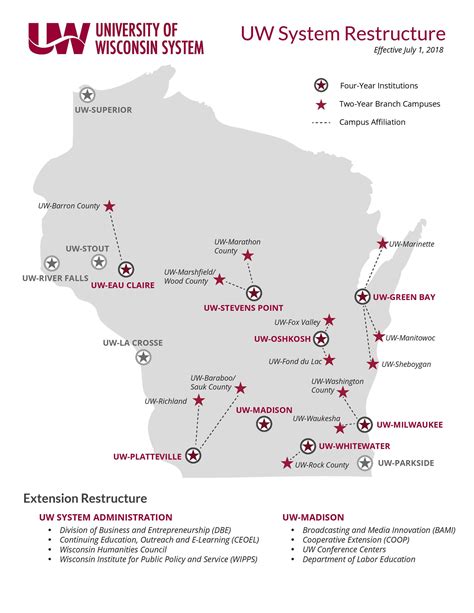
University of Wisconsin System stands among the most esteemed higher education institutions in the nation. Yet, understanding its ranking and what it truly signifies can be a complex endeavor. Are the rankings a valuable measure of institutional excellence or simply a reflection of subjective criteria? What factors influence the University of Wisconsin System’s ranking, and how does it compare to its peers? Join us as we delve into the intricacies of university rankings and their profound impact on the reputation and decision-making processes of students. We will investigate the strengths and weaknesses of the UW System in the rankings and explore the strategies it employs to enhance its standing. As we navigate this intricate landscape, we will uncover the significance of rankings in shaping the future of higher education.
The Importance of Rankings in Higher Education
Rankings are a vital tool for students, parents, and policymakers to evaluate the quality of higher education institutions. They provide a standardized way to compare universities based on various metrics, such as academic reputation, faculty resources, and student outcomes.
Rankings can help students make informed decisions about where to pursue their education. They can also be used by policymakers to allocate funding and resources to universities.
Factors that Influence Rankings
There are many different factors that influence university rankings. Some of the most common factors include:
- Academic reputation: This is based on surveys of scholars and administrators who are familiar with the university’s academic programs.
- Faculty resources: This includes factors such as the number of faculty members, their qualifications, and their research productivity.
- Student outcomes: This includes factors such as graduation rates, job placement rates, and salaries of graduates.
- Financial resources: This includes factors such as the university’s endowment, operating budget, and tuition costs.
Methodology Behind the Rankings
There are a number of different organizations that publish university rankings. Some of the most well-known rankings include the U.S. News & World Report, the Times Higher Education World University Rankings, and the ShanghaiRanking Academic Ranking of World Universities.
Each organization uses its own unique methodology to compile its rankings. However, most rankings use a combination of the factors described above.
Criticisms of Rankings
Rankings have been criticized for a number of reasons. Some critics argue that rankings are biased towards certain types of universities, such as those with large endowments or research programs.
Other critics argue that rankings are too focused on short-term factors, such as graduation rates and job placement rates. They argue that rankings should also consider long-term factors, such as the impact of a university’s graduates on society.
UW System’s Ranking Performance Over Time
The UW System has consistently ranked among the top public university systems in the United States. In the 2023 U.S. News & World Report rankings, the UW System was ranked as the 11th best public university system in the nation.
The UW System’s ranking performance has been relatively stable over the past several years. In the 2018 U.S. News & World Report rankings, the UW System was ranked as the 12th best public university system in the nation.
Factors Contributing to UW System’s Ranking Performance
There are a number of factors that have contributed to the UW System’s strong ranking performance.
- Strong academic programs: The UW System’s universities offer a wide range of academic programs, many of which are ranked among the best in the nation.
- Highly qualified faculty: The UW System’s universities have a faculty of highly qualified and experienced professors.
- Diverse student body: The UW System’s universities have a diverse student body, which contributes to a vibrant and intellectually stimulating learning environment.
- Commitment to research: The UW System’s universities have a strong commitment to research, which has resulted in major breakthroughs in a number of fields.
UW System’s Strengths and Weaknesses in the Rankings
The UW System has a number of strengths that have contributed to its strong ranking performance. These strengths include:
- Strong academic programs: The UW System’s universities offer a wide range of academic programs, many of which are ranked among the best in the nation.
- Highly qualified faculty: The UW System’s universities have a faculty of highly qualified and experienced professors.
- Diverse student body: The UW System’s universities have a diverse student body, which contributes to a vibrant and intellectually stimulating learning environment.
However, the UW System also has a number of weaknesses that have prevented it from achieving even higher rankings.
- Limited financial resources: The UW System is a public university system, and as such, it is subject to state budget cuts.
- Large class sizes: The UW System’s universities have a large number of students, which can lead to large class sizes.
- Lack of a strong online presence: The UW System’s universities have not yet developed a strong online presence, which can make it difficult for students to access their courses and materials.
How UW System Compares to Other Universities
The UW System compares favorably to other public university systems in the United States. In the 2023 U.S. News & World Report rankings, the UW System was ranked as the 11th best public university system in the nation.
The UW System also compares favorably to private universities. In the 2023 U.S. News & World Report rankings, the UW System was ranked as the 40th best university in the nation, both public and private.
UW System’s Competitive Advantages
The UW System has a number of competitive advantages over other universities, including:
- Strong academic programs: The UW System’s universities offer a wide range of academic programs, many of which are ranked among the best in the nation.
- Highly qualified faculty: The UW System’s universities have a faculty of highly qualified and experienced professors.
- Diverse student body: The UW System’s universities have a diverse student body, which contributes to a vibrant and intellectually stimulating learning environment.
- Affordable tuition: The UW System’s universities offer affordable tuition and fees, making them a great value for students.
The Impact of Rankings on UW System’s Reputation
The UW System’s strong ranking performance has had a positive impact on its reputation. The UW System is now seen as a leading public university system in the United States.
The UW System’s ranking performance has also helped to attract top students and faculty to the system’s universities. This has created a virtuous circle, in which the UW System’s strong ranking performance has led to even stronger academic programs and a more talented student body.
Benefits of a Strong Reputation
A strong reputation has a number of benefits for the UW System, including:
- Increased student enrollment: Students are more likely to apply to and enroll in universities with strong reputations.
- Increased research funding: Universities with strong reputations are more likely to receive research funding from government agencies and private foundations.
- Increased alumni support: Alumni are more likely to donate to universities with strong reputations.
The Role of Rankings in Student Decision-Making
Rankings play a significant role in student decision-making. Students often use rankings to compare different universities and make decisions about where to apply and enroll.
Rankings can also help students identify universities that are a good fit for their academic interests and career goals. For example, students who are interested in research may want to consider universities with strong research programs.
How to Use Rankings Effectively
Students should use rankings as one of many factors when making decisions about where to go to college. Other factors to consider include:
- Academic programs: Students should research the academic programs offered by different universities to find the ones that are the best fit for their interests and goals.
- Faculty: Students should research the faculty at different universities to find out about their qualifications and research interests.
- Student body: Students should research the student body at different universities to find out about the diversity of the student body and the campus culture.
- Location: Students should consider the location of different universities to find one that is convenient for them.
Strategies for Improving UW System’s Ranking
The UW System can take a number of steps to improve its ranking performance, including:
- Investing in academic programs: The UW System should invest in its academic programs to improve their quality and reputation.
- Hiring and retaining top faculty: The UW System should hire and retain top faculty to improve the quality of its teaching and research.
- Increasing student diversity: The UW System should increase the diversity of its student body to create a more vibrant and intellectually stimulating learning environment.
- Improving online presence: The UW System should improve its online presence to make it easier for students to access their courses and materials.
By taking these steps, the UW System can improve its

